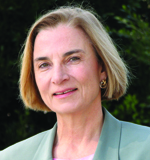March 2014

Patricia W. Finn, MD
Leadership is in the spring air. March is when we elect a new secretary-treasurer who will go on to become president of the Society.
We are very fortunate to have two superb candidates this year: Karen A. Fagan, MD, and Marc Moss, MD. Both have already served the Society in ways that have advanced its mission. Both are distinguished clinicians and researchers. And both have interesting ideas about opportunities the Society has for better serving its members, the larger health care community, and ultimately patients.
I encourage you to read their profiles, watch videos they have made, and review their answers to questions posed by the Nominating Committee. Voting for Society leaders is an important privilege and a responsibility of being a full citizen of the ATS.
With this year’s election upon us and with the Society’s initiative on health equality taking shape, I have been reflecting on the nature of leadership. The words and works of two giants of the 20th century-Martin Luther King Jr. and Nelson Mandela-provide guideposts that, I believe, are highly instructive for our professional lives.
Dr. King wrote that “our lives begin to end the day we become silent about things that matter.” Wherever we work, whether we have administrative titles or not, we can be leaders by speaking up. When something is wrong or could simply be made better, when we speak up, we are leaders.
Of course, both men knew that change does not come quickly, nor does it come without perseverance. Change, Dr. King noted, is neither inevitable nor automatic, but something that is earned through sacrifice and steadfast application of principles.
Health equality, which both men recognized as an important civil right, is a monumental challenge, perhaps the great challenge of our time. It is one that won’t disappear as new cures and promising medical technologies are discovered. And it won’t go away when we find ways to insure all patients, as important as that is. Even if everyone everywhere had access to health care tomorrow, the scourge of COPD, asthma, TB, lung cancer, pneumonia, and many other chronic and infectious diseases would affect disproportionately many different populations.
This is why I am thrilled that the community of the ATS has embraced the health equality initiative I proposed at the beginning of my presidency. I want this issue to become part of the Society’s DNA. If we are going to effect change, it will have to be embedded in everything we do. Because this issue is not one over which we can declare victory in a year, a decade, or perhaps ever. But we can make a difference immediately in small but important ways while working towards larger, more profound changes.
“Education is the most powerful weapon which you can use to change the world,” Mr. Mandela said. This is especially true for an organization like the ATS. We have an opportunity to address health equality by increasing awareness and disseminating information to many important groups: political, civic leaders, and business leaders; patients and their families; and clinicians and scientists across a spectrum of disciplines.
The ATS also possesses something Dr. King considered essential to change: the “tireless exertions and passionate concerns of dedicated individuals.” Together, I believe we can make things better for those whose health is affected by socioeconomic status, race, geography, mental illness, gender, or the many other factors that can create inequalities in wellbeing.
Must we possess the once-in-a lifetime qualities of Mr. Mandela or Dr. King to change the order of things? I don’t think so. Mr. Mandela, himself, once noted that he was an “ordinary man who had become a leader because of extraordinary circumstances.”
Health equality is a complex issue that affects the citizens of every nation. Its causes and consequences are not well understood, nor are the tools for addressing disparities readily apparent. It is an extraordinary issue, and one that can transform each of us into a leader.

